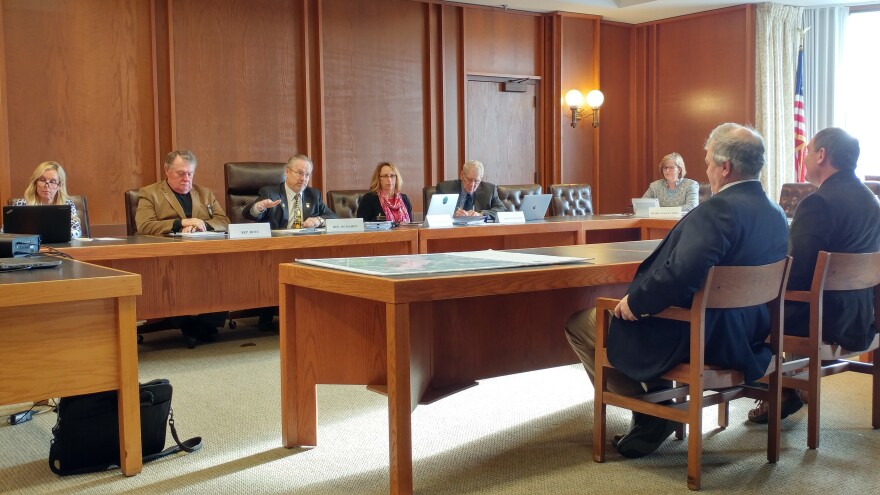The state commission on the Seacoast’s high cancer rates signaled Friday it would push for cleanup at Coakley Landfill, despite objections from the Environmental Protection Agency.
The legislators and public representatives who make up the Cancer Cluster Investigation Commission have a report due this fall on what's driving those cancer rates, and they’ve honed in on the EPA’s Coakley Landfill Superfund site as a likely culprit.
Representative Charles McMahon, a Republican from Windham, chairs the commission.
"What we have here is, what is the cause of all the concern, the expense and the implied danger of contamination? And that's the landfill itself,” he said in an interview with NHPR. “And that's why I proposed today we should move towards eliminating the landfill – remediating or eliminating it, versus testing it as it is in perpetuity."
The unlined landfill was capped in the 1990s, but may still be spreading perfluorinated chemicals, or PFCs – a once-common manufacturing ingredient and possible carcinogen that the EPA only began regulating in recent years.
The EPA is still monitoring the Coakley site and plans to study the bedrock beneath it. But they say it’s not toxic enough to trigger cleanup. And they dispute its connection to nearby cancer cases and deaths.
“How many more?”
Rep. McMahon disagrees, and says there’s sufficient “indication” that the landfill is to blame.
“Why do we need to wait when we’ve all agreed there’s a problem?” he asked.
On Friday, regional EPA spokesman Jim Murphy took the brunt of the commission’s frustration. No representatives from the state Department of Environmental Services or the towns and companies responsible for the landfill contamination, together called the Coakley Landfill Group, were on hand to weigh in.
“How many more fetal deaths, or how many more pediatric deaths would it take you to put this way at the top of your agenda?” asked commission member James Zuckerman, a Harvard obstetrician and the health officer for New Castle. “I keep hearing you saying a study will be a year, two years, whatever, and keep putting it off. We have to deal with reality, and I’d like you to answer that question.”
“Alright, well, I'm not aware that any of the pediatric deaths were linked to Coakley,” replied Murphy. “I think that's the only way I can answer that."
Commissioners asked that the EPA engineer who oversees the Coakley site speak at their next meeting about more thorough cleanup options.

They also to know how has been spent at the landfill since it was capped, and whether cleanup feasibility studies done in the 1990s could be updated to speed remediation along.
In an interview after the meeting, Murphy reiterated that Coakley isn’t contaminating drinking water with PFCs above the federal legal limit right now.
“We know that there could be a problem in the future, and that’s why we’re continuing to study it,” he says. “I don’t know if [Coakley Landfill] is really the answer to the Cancer Commission, but certainly, we’re going to cooperate with the commission as much as we can.”
Rep. Mindi Messmer, a Rye Democrat who sits on the commission, says that’s the argument that made her questions to Murphy more tense than normal on Friday.
“It’s not just Coakley, but this is the one thing we really do know is an issue, and we do know it’s one of the things we need to check it off the list,” she says. “We know it’s a problem, we know it can be addressed. ... It’s not like we’re starting over from scratch, and that’s the frustration that you hear.”
Messmer is also running for Congress, and has sponsored various bills seeking to make the state's PFC limit stricter than the EPA's.
Fishing precautions
Commissioners also told officials from the state Department of Fish and Game to suspend trout stocking and work toward temporarily banning consumption of fish from nearby Berry's Brook.
Murphy said the EPA has asked the Coakley Landfill Group to figure out how to pay to test those fish for toxins. He said their plan should be out for public comment by the end of the month.
The Landfill Group's newly hired statehouse lobbyist sat in on the commission Friday, but declined to testify or answer legislators’ or reporters’ questions.
A new bill from Rep. Messmer seeks similar fish testing, but Fish and Game commissioner Glenn Normandeau told commissioners on Friday that request would be prohibitively expensive – on the order of $600 to $3,000 per fish.
He said if necessary, he’d prefer just to stop stocking waterways that have potential contamination issues.
The commission has met five times since it was formed last year, according to Rep. McMahon. They'll meet next around March.








